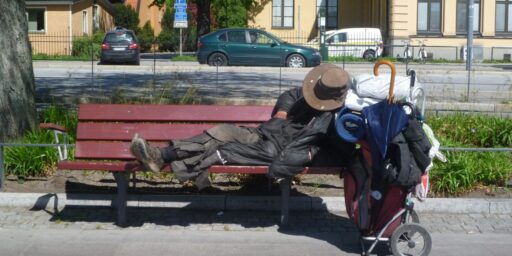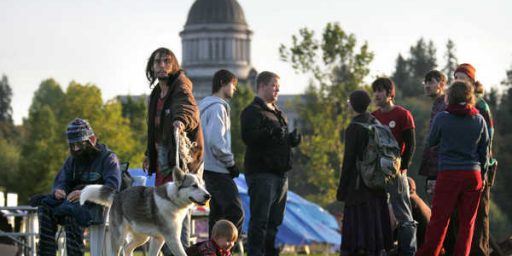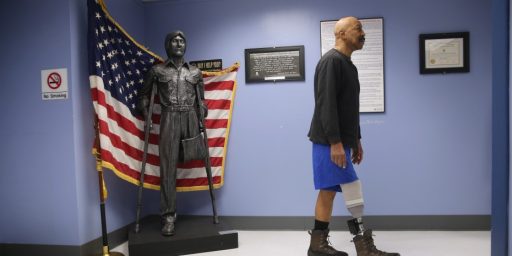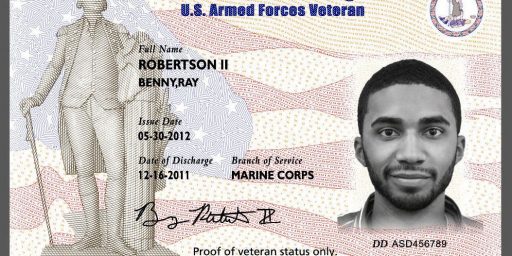1 in 4 Homeless are Veterans
A highly touted report coming out today shows that 1 in 4 homeless are veterans.
Veterans make up one in four homeless people in the United States, though they are only 11 percent of the general adult population, according to a report to be released Thursday.
And homelessness is not just a problem among middle-age and elderly veterans. Younger veterans from Iraq and Afghanistan are trickling into shelters and soup kitchens seeking services, treatment or help with finding a job.
The Veterans Affairs Department has identified 1,500 homeless veterans from the current wars and says 400 of them have participated in its programs specifically targeting homelessness.
The Department of Veterans Affairs cited an even higher figure back in August, reporting that “one-third of the adult homeless population have served their country in the Armed Services.”
According to the Census Bureau, “In 2000, there were 208.1 million civilians 18 years old and older. Almost 26.4 million of these people, or 12.7 percent, were veterans. Presumably, there are no homeless people currently serving in the United States military, so that’s a reasonable baseline.
A couple of things to keep in mind, though.
First, our veteran population is overwhelmingly male: Only 6 percent are women, although the percentages increase for younger veterans. The same is true of the homeless population (“single men comprise 44 percent of the homeless, single women 13 percent”).
Second, despite a disproportionate share of veterans among the homeless population, the Census Bureau also reports, “Poverty rates were low among veterans for every period of service. Overall, 5.6 percent of veterans lived in poverty in 1999, compared with 10.9 percent of the U.S. adult population in general.” It is true, however, that “The youngest veterans, those who served in August 1990 or later, were among the most likely to be poor, with a poverty rate of 6.2 percent.” Then again, that’s true of the general population as well.
The DVA offers additional insights:
Atlthough many homeless veterans served in combat in Vietnam and suffer from PTSD, at this time, epidemiologic studies do not suggest that there is a causal connection between military service, service in Vietnam, or exposure to combat and homelessness among veterans. Family background, access to support from family and friends, and various personal characteristics (rather than military service) seem to be the stronger indicators of risk of homelessness.
Almost all homeless veterans are male (about three percent are women), the vast majority are single, and most come from poor, disadvantaged backgrounds. Homeless veterans tend to be older and more educated than homeless non-veterans. But similar to the general population of homeless adult males, about 45% of homeless veterans suffer from mental illness and (with considerable overlap) slightly more than 70% suffer from alcohol or other drug abuse problems. Roughly 56% are African American or Hispanic.
So we have this strange dichotomy: Veterans are less likely to be poor than their counterparts but are also somewhat more likely to be homeless. Much (all?) of this disparity goes away when controlling for demographics, since veterans are overwhelmingly male and disproportionately black or Hispanic.
And whatever disparity remains seems not to be explained by the defining characteristic of veterans, service in the military. The vast majority of veterans, homeless or otherwise, did not serve in combat. Those who did suffer the traumas of combat are apparently no more likely to be homeless than anyone else.






I don’t see where the article defines what a ‘veteran’ is. Do they define a veteran as one who is honorably discharged – or as one who served at least a day in uniform? Vastly different in my mind. A person who washes out or is dishonorably discharged may be more likely to continue to fail the rest of their life.
The MSM and Hollywood appear dead set to replay the same “vet victimization” narrative from Viet Nam and Gulf War. Look at the current crop of movies. I now understand the venom many VN vets felt towards the anti-war left.
I am sorry but this sounds like the sort of stuff that came out about Vietnam Vets and was found to be BS (The rates were the same or less than the general population).
I will wait for a better reviews of the data.
Whatever the reason for a vet being homeless, doesn’t “support our troops” mean we shouldn’t allow it? If a vet’s house burns down for reasons totally unrelated to military service, that’s still a veteran who sacrificed for us, and we have an obligation to them.
I don’t see why we have to be sure that the vet is a proper and honorable and deserving person before we help them, either. It does nobody any good to have anybody wandering the street exhausted and sick (whether mentally or physically). You can, and should, expect somebody to be productive after a decent meal, a full night’s rest, and whatever health treatment they need to get back to battery. A person has to be allowed to contribute something to the community, for human dignity. Expecting functional work out of somebody who slept on the sidewalk last night and hasn’t even had a place to wash makes no sense.
If we have any respect for our troops, we shouldn’t have any of them homeless. If we have any respect for human dignity, we shouldn’t have anybody homeless.
I’m not sure what veteran status has to do with that, though. Surely, it’s not productive to have non-vets sleeping on the sidewalks, either.